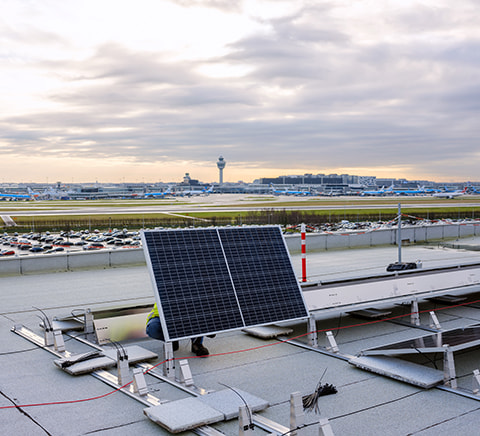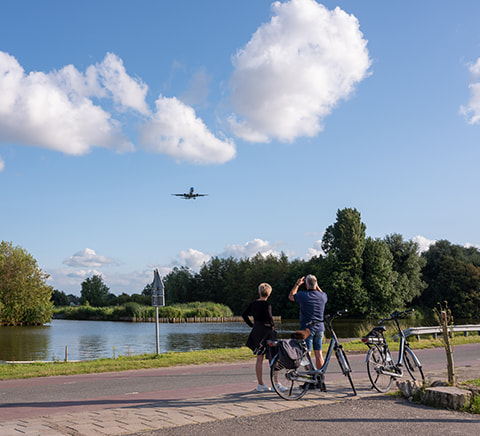

Schiphol has been connecting the Netherlands with the rest of the world for more than 100 years. It's something we do with pride. At the same time, we realise that our activities have an impact on the environment and the local area. And we are aware that the drawbacks involved should play a greater role in the choices we make. We want to keep on connecting the Netherlands in the future, but we must do it better.
That's why we are going for a quieter, cleaner and better Schiphol. An airport and an aviation industry in better equilibrium with the world around it. It's time to give the local environment, our employees and the aviation industry perspective. We're already working hard to achieve that, but it's time to shift up a gear. That's why we are taking action and leading the way to initiate change. We are moving forward with the following eight steps.

We want to transition as quickly as possible, by 2025-2026 at the latest, to a new system with clear agreements on noise and CO2 emissions. We are calling on the government to come up with a legally enshrined system in which the means (the number of air transport movements) is no longer leading, but rather the end (less nuisance and emissions, in line with the Paris Agreement). Because by flying in cleaner and quieter aircraft, and with sustainably produced fuels, we achieve what we really want: lower impact aviation. In this way, we better balance our operations with the needs of the environment and our employees, and we contribute to global climate goals.


The quieter the better. After all, the noisiest aircraft cause above-average noise nuisance. That's why we want to prevent even more of the noisier types of planes from coming to Schiphol as of 2025/2026. By tightening the maximum permissible daytime and night-time noise limits and further encouraging the use of quieter aircraft, nuisance in the surrounding area will decrease.
We want to stop flying during a large portion of the night starting winter 2025/2026. By no longer allowing aircraft to depart between 00:00 and 06:00 and by no longer allowing flights to arrive between 00:00 and 05:00, there will be around 10,000 fewer night flights. We will limit the reallocation of flights to the very start or very end of the night/early morning as much as possible too. In this way, we help our environment get a better night's sleep.


We want to stop facilitating business air traffic and air taxis at Schiphol-East (General/Business Aviation) as of 2025/2026. Although these flights do not count towards the maximum number of permitted aircraft movements, they do cause a disproportionately large amount of noise nuisance and CO2 emissions per passenger compared to commercial flights. By only accepting social air traffic, such as police and ambulance helicopters and the coast guard, the nuisance and emissions from small aircraft are significantly reduced.
We are definitively abandoning plans for a parallel Kaagbaan Runway. Land for this has been reserved for more than 20 years but it puts unnecessary pressure on the already scarce space in the area. A study in 2019 showed that a second Kaagbaan would not lower noise nuisance but only transfer it to another location. Besides, an additional runway is unnecessary at the current and projected number of aircraft movements. We are asking the government to revoke the planning reservation, thus ensuring clarity for our environment.


We realise that, despite all nuisance-reducing measures, aviation continues to have an impact on the local environment. Therefore we are setting up an environmental fund. Between now and 2030, Schiphol will be making up to a maximum of € 10 million a year available through this fund to be invested in innovative construction concepts, home insulation and area development. This way, we contribute to the improvement of the living environment.
We are committed to safeguarding the position of cargo at Schiphol and that's why we want to keep 2.5% of the available take-off and landing slots available for cargo starting 2025/2026. The cargo sector provides a lot of employment opportunities in the area and is valuable for the economy and business climate. We do expect cargo companies to comply with the new, stricter rules for noisy aircraft.


We want people to work with pride and dignity at our airport again. Whether they are employed by Schiphol or another employer. For too long we have focused on lowering costs and now we realise it's time for a new approach. Because everyone at Schiphol matters. There must be good terms and conditions of employment for everyone working at the airport. We are committed to better pay in all sectors, better protection against emissions, less competition between handling companies and better conditions of employment in baggage handling. That's how we can make sure people come to work at Schiphol and stay here.
We know that aviation has to become more sustainable and we are confident that it’s possible.

Want to receive updates about how things could be quieter and cleaner?
